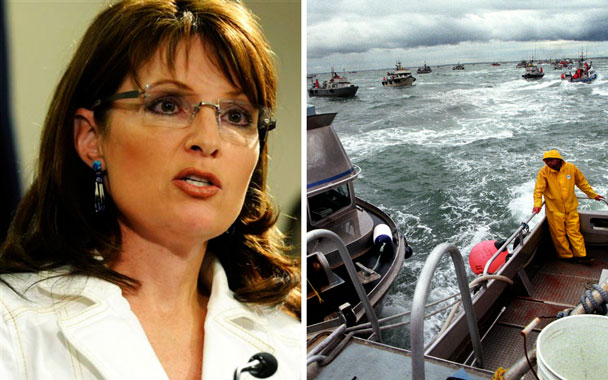At the very least, there was something fishy about Alaska Governor (and Vice Presidential hopeful) Sarah Palin’s decision to speak out publicly against the state’s Clean Water Initiative late last month. There may also be something blatantly illegal about her advocacy for defeating the ballot initiative, which ultimately failed to pass when 57 percent of Alaskans voted against it.
A bit of background. The Clean Water Initiative (aka Ballot Measure 4) was put in place to restrict the amount of arsenic and other toxic pollutants that new, large-scale mines could dump into the state’s waterways. Its stated goal was to protect human health and safeguard salmon that use the rivers and streams to spawn. More specifically, it was aimed at a massive gold and copper operation called Pebble Mine located directly upstream of Bristol Bay, site of one of the world’s largest and most sustainable wild salmon fisheries, which produced 31 million pounds of king, sockeye, and chum salmon in 2007.
The law in Alaska forbids a governor from officially lobbying for or against a ballot initiative such as Ballot Measure 4. To get around the law, Palin exercised what she called “personal privilege” when she said to reporters, “Let me take my governor’s hat off for just a minute here and tell you, personally, Prop 4—I vote no on that.”
I will leave it to legal minds in Alaska whether doffing a metaphorical hat and claiming personal privilege exempt a person from obeying the law of the land, but one thing the possible veep’s stance clearly shows is an alarming lack of judgment.
Do the calculations yourself. On one hand, you have an industry (mining) that employs 5,500 people in your state and generates $200 million in tax revenues. It is based on a finite resource that will run out one day. On the other hand, you have an industry (salmon fishing in Bristol Bay alone) that employs 12,000 people and contributes $250 million to the economy. This industry is based on a sustainably managed renewable resource that will be around long after the last ton of ore is dug out of Pebble Mine. Which would you favor?
There’s a deeper tragedy here. Several years ago, I was honored to spend a week out on the boats with Bristol Bay’s salmon fishermen, a hardworking, hard-living crew if ever there was one. At the time, before Americans became educated about the environmental and health benefits of wild Alaska salmon, the biggest threat to the fishermen’s livelihood was competition from cheap, farmed salmon from Chile that had driven prices to the point where it was questionable whether even a decent day’s catch would pay the fuel bill, not to mention the bank loan.
Pebble Mine still has to clear some regulatory hurdles before it goes into full operation, probably sometime around 2011. If that happens, the greatest threat to Bristol Bay’s salmon fishery will have come from bad decisions made by homegrown politicians.




 Pinterest
Pinterest


